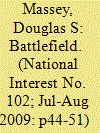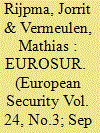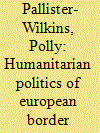| Srl | Item |
| 1 |
ID:
090195


|
|
|
|
|
| Publication |
2009.
|
| Summary/Abstract |
The only problem with the invasion is that it never happened. The U.S.-Mexico border is not now and has never been out of control. From 1950 to the present, the total number of migrants entering the United States from Mexico has varied very little. There has certainly been no massive upsurge. What changed were the auspices under which Mexicans entered the country, their place of entry, their ultimate U.S. destination and their tendency to remain here rather than return home. Workers previously labeled immigrants became illegals. The border was fortified. States with high immigrant populations cracked down. Walls were built. Immigration turned into a militarized policy issue. And since it became increasingly risky for Mexicans to cross the border, once here, they remained. All these changes are a consequence of our own misguided immigration and border policies.
|
|
|
|
|
|
|
|
|
|
|
|
|
|
|
|
| 2 |
ID:
138872


|
|
|
|
|
| Summary/Abstract |
This article analyses the origins and development of the European Border Surveillance System (EUROSUR) in order to better understand its functioning in view of its stated objectives. Particular attention will be devoted to the European Commission’s recurring claim that one of EUROSUR’s main goals is to save lives at sea. This contribution questions that assertion. It rather considers EUROSUR as representative of the steady, technocratic development of a European system for border management. The reliance on the exchange of information, the reinforcement of FRONTEX, the European Union’s agency for the coordination of operational cooperation between national border guards and the emphasis on cooperation with third countries support this claim.
|
|
|
|
|
|
|
|
|
|
|
|
|
|
|
|
| 3 |
ID:
137615


|
|
|
|
|
| Summary/Abstract |
This paper explores humanitarianism in the practice of Frontex-assisted Greek border police in Evros and of Frontex at their headquarters in Warsaw. Building on the increase in humanitarian justifications for border policing practices as well as the charges of a lack of humanity, the paper analyzes the relations between humanitarian responses and border policing where humanitarianism is used for framing and giving meaning to institutional and operational practices. In offering an interpretive view of border policing undertaken by people in their working lives across sites and scales, it builds on the critical literature addressing the multifaceted nature of border control in Europe today. At the same time, it speaks to wider debates about the double-sided nature of humanitarian governance concerned with care and control. It argues that while humanitarian motivations have implications for operations in the field and help to frame “good practice” at the policy level, humanitarianism should not be seen as additional or paradoxical to wider border policing operations within forms of governance developed to address the problems of population. Conflict arises in the paradox of protection between the subject of humanitarianism and policing, the population, and the object of border control, the territorially bounded state or regional unit.
|
|
|
|
|
|
|
|
|
|
|
|
|
|
|
|